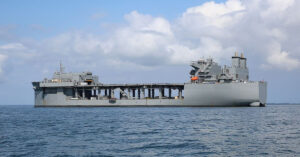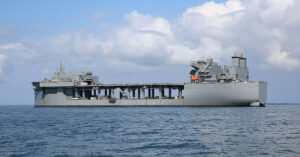U.S. Navy’s Military Sealift Command To Sideline 17 Support Ships Due To Shortage Of Qualified Mariners

Watch: Houthis Release Video Of Explosions On Oil Tanker Sounion After Attacking It In Red Sea
August 27, 2024
World’s 1st Ammonia-fuelled PSV Vessel Set To Begin Operations In 2026
August 27, 2024

The U.S. Navy is considering sidelining 17 support ships due to a shortage of qualified mariners, according to a plan drafted by the Military Sealift Command.
The “force generation reset” aims to resolve the ongoing shortage of qualified mariners to operate the Navy’s support vessels.
According to the sources, the ships affected are 12 spearhead-class Expeditionary Fast Transports (EPF), 2 Lewis and Clark-class replenishment ships, 2 forward-deployed Navy Expeditionary sea bases, and 1 fleet oiler.
The forward-deployed sea bases identified are the USS Lewis Puller (ESB-3) in Bahrain and the USS Hershel “Woody” Williams (ESB-4) in Greece.
These vessels will undergo an extended maintenance period, and the crews will be reassigned to other ships within the fleet.
The proposed plan is awaiting approval from Chief of Naval Operations Adm. Lisa Franchetti and could potentially cut the demand for civilian mariners by 600-700 billets.
There are roughly 4,500 billets for mariners across various U.S. support ships, with a ratio of about 1.27 mariners per billet.
The uneven ratio has led to major retention issues, with mariners often spending extended periods at sea without enough time off.
A former MSC master mariner stated that the current system requires mariners to work a challenging schedule of four months at sea followed by one month off. This system has impacted mariners’ work-life balance, worsened by the rigorous training requirements and a lack of adequate leave for junior mariners.
The continuous challenges have been intensified by the COVID-19 pandemic, which resulted in gangway-up measures that prevented mariners from leaving their vessels.
Retired MSC mariners have reported that these conditions have led to increased resignations, with many leaving to maintain a better work-life balance.
If implemented, the great reset could help reduce some issues by increasing the mariner-to-billet ratio to around 1.5. This would result in improved crew management and support the deployment of newer vessels like the John Lewis-class fleet oiler.
The plan will also impact a large section of the fleet. The 12 Spearhead-class EPFs, among the ships proposed for sidelining, have played crucial roles in U.S. outreach missions in Africa, Europe, and the Pacific.
The EPFs, manufactured by Austal USA, are high-speed aluminium catamarans designed to support a range of missions and are expected to serve as the foundation for a new class of hospital ships entering the fleet by the end of the decade.
Sal Mercogliano, a former MSC mariner and associate professor of history at Campbell University, criticized the plan as an outcome of years of negligence and mismanagement within the force.
Reference: USNI News
U.S. Navy’s Military Sealift Command To Sideline 17 Support Ships Due To Shortage Of Qualified Mariners appeared first on Marine Insight – The Maritime Industry Guide
Source: Maritime Shipping News


